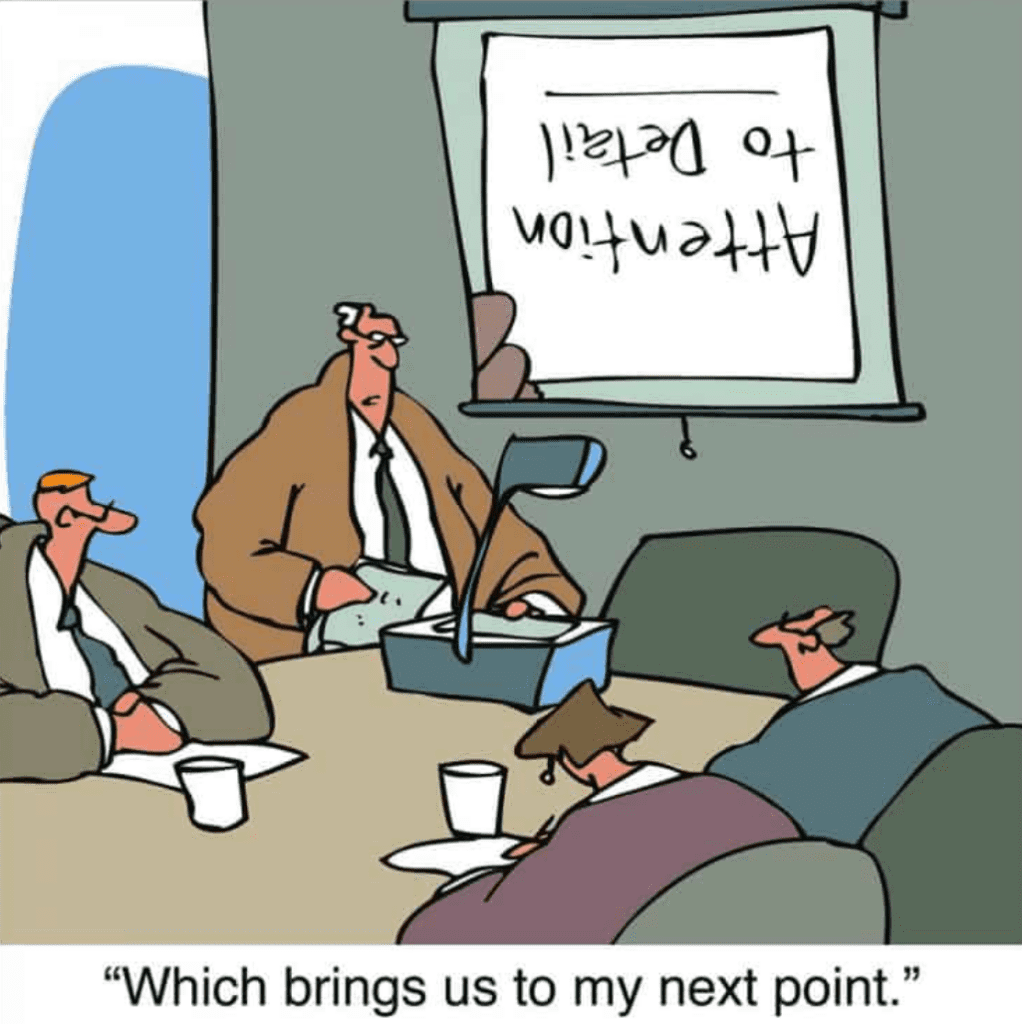
Most people overlook attention to detail because it’s not always fun – it requires hard work and fully applying ourselves to a task. Others believe that the excess information provided by paying attention to detail often goes unnoticed. But to be truly exceptional, we must devote ourselves to the quality of our work because people do notice. Learn why the little details make big things happen and how to boost your ability to detect and deal with the details. (Estimated reading time: 11 minutes)
“Details matter. They create depth, and depth creates authenticity.”
— Neil Blumenthal
The launch of a new iPhone is a special occasion for Apple fans. Long lines outside retail stores worldwide are a common site on early releases of the beloved smartphone. Eager consumers wait for hours to get their hands on the latest model.
Why do people love Apple products and keep buying the latest versions, even if the updates are insignificant?
Apple devices look beautiful and are a pleasure to use. Customers can sense the artistry in the conception and development of the products. The attention to detail, the user experience, and every aspect of the device design deliver something meaningful.
The man behind Apple’s magic is its founder, Steve Jobs. While Jobs passed away in 2011, his legacy is a company imbued with his spirit and founded on his principles. He was driven by perfection and celebrated quality.
Jobs was a stickler for detail. From his perspective, every aspect of his creations mattered, no matter how tiny or seemingly insignificant. At the helm of Apple, he pored over every little detail — whether it was on a product, store, or company level.
Jobs credits his father for his keen eye. His father impressed upon him the importance of crafting the backs of cabinets and fences with the same quality as the front and sides, even though they would never be seen.
His focus on the little details that other CEOs might gloss over was apparent numerous times. Former Google Vice President Vic Gundotra recalled how Jobs once called him on a Sunday to speak about his concern regarding the color of the Google logo.
“I’ve been looking at the Google logo on the iPhone and I’m not happy with the icon. The second O in Google doesn’t have the right yellow gradient,” Jobs said. “It’s just wrong, and I’m going to have Greg fix it tomorrow. Is that okay with you?”
After responding yes, Gundorta received an email from Jobs a few minutes later. The subject line was “Icon Ambulance.” The body contained directions to work with his team.
Jobs intuitively knew every detail mattered, from deciding which books to include for free in the iBook app to the songs used in iPod commercials. His biography is loaded with examples of Jobs looking into even the most seemingly insignificant details to get things right.
Some argue that he took it too far and even called it obsessive. But his genuine passion for the details is what made Jobs capable of building a behemoth brand like Apple and solidifying his legacy.
We can take a page out of Jobs’ book when pursuing our versions of excellence. As long as we maintain balance, paying attention to detail shows others we care and reflects our values. It shows that we put our hearts into what we have done and care about others. Like Steve Jobs, these secret ingredients turn a person from good to great.
Why do small things matter (and what that looks like)?

Do you remember a time when you received exceptional customer service? Besides providing a solution to your problem or meeting a need, what did the company do to make you feel seen, heard, and understood?
It likely had something to do with the attention to detail shown. If it made you say, “Wow!” you can be confident that someone labored for hours to ensure they got it ’just right.’
Whether it’s how a dish is perfectly garnished at a restaurant, how your towels are folded in your hotel bathroom, or the smile and warmth of a store assistant helping you find your clothing size – those small details and gestures make the experience memorable.
People are always looking for the next best thing to get ahead in business. Something that will propel them forward. But the people and companies that reach their potential take the extra steps to do what others overlook. They immerse themselves in attention to detail.
Most people overlook attention to detail because it’s not always fun – it requires hard work and fully applying ourselves to a task. Others believe the additional information and effort go unnoticed, so it’s not a wise investment of their time and energy.
But, to be truly exceptional, we must devote ourselves to the quality of our work because people do notice quality when they see it. A person who pays attention to the details communicates to the world that they care.
Whether you’re a teacher, manager, janitor, or doctor, your ability to pay attention to detail will determine your success or failure. It’s the little details that make big things happen. Love and care are in the details, making people fall in love with what you do and get excited about what you produce.
Here are some examples of what attention to detail looks like:
- Practice: Rehearsing for a speech instead of ‘winging’ it.
- Communication: Paying attention to texts and emojis you send your significant other and considering how it might impact them.
- Planning: Creating a checklist of what you need during your vacation, including packing emergency supplies.
- Accuracy: Fact-checking an article you write before you publish it.
- Refinement: Adding softer and ambient lighting to create a cozy atmosphere in your bedroom and lounge.
Success doesn’t just happen. The big wins are the byproduct of an understanding that the small impacts the big. Small things become great when done with love.
Attention to detail: the key to mastery and success

Most people ignore the details – that’s why those who don’t, stand out. They get better jobs, have more fulfilling relationships, have more financial abundance, and experience an overall better quality of life.
If we are to notice and absorb details, we must learn how to manage our attention. Attention is like a spotlight shining on the things we choose to focus on. Attention is not just about that focus but also about knowing what to ignore.
There’s lots of information competing for our consideration, and we need to learn how to tune it out to avoid distractions. Unlike our ancestors who paid attention to select details in environments like predators and protecting their kin, we must deal with the media bombarding us with messages and headlines to get our attention.
The outcome is that our attention is pulled in several different directions on any given day. This can make us feel powerless, like we have no control over where our focus goes. The goal is not to shut ourselves away from modern stimuli but to be more mindful about what and how we take it in, rather than being reactive.
Because attention spans have become a limited resource in modern times, employers, customers, and society consider those in control of it more valuable. Having knowledge is not enough anymore – you need to be able to apply it in creative ways.
In the age of information, most knowledge is available at our fingertips, but there aren’t many who can make connections between what they learn because of how fragmented human attention has become.
In the academic and professional spheres, detail-oriented students and employees have an edge over their competition. Half-hearted projects and performances demonstrate laziness and a lack of interest in the work. Fortune favors those who pay attention to the things others don’t.
Leonardo Da Vinci, like most masters of a craft, hated being rushed. He wanted to be immersed in his art to build in enough details to animate his pieces, making them come to life. He wanted to understand things from the inside out and to pick up on the forces that make them alive and dynamic. He knew understanding each element, no matter how seemingly small or insignificant, was essential to create the “wow” factor.
Most people don’t have the attention span or patience to absorb the finer points at the heart of their work. They rush to create surface effects using broad brush strokes. This type of creation rarely comes across as genuine and appealing and may fail to connect with its audience.
To produce something impactful and visceral, you must dive into the details. Everything you put your mind to is an amalgamation of minute details that connect to form a life force of its own.
You do this by taking the time to think about each word you use in a social media post, the note of each song, or the tweaks in your training program to take your performance to the next level. Every detail adds up, eventually making you a master.
Ten ways to increase attention to detail

It can be tempting to let the details slide when you’re running low on energy, time, or creative reserves. You tend to rush through tasks and assume people won’t notice your subpar work.
To prevent this from happening, finetune your attention abilities. Here are ten tips to increase your attention to detail:
1. Get organized.
You can’t get things done when your mind is burdened by sorting through a physical or mental mess. Having structure and order frees up mental space so you can pay attention to detail. It increases productivity and efficiency. For example, if you’re working on a project that requires you to analyze mountains of documents, you will do a much better job if they’re piled and categorized in an orderly way instead of strewn all over your desk and floor.
2. Practice active listening.
When conversing or listening to a speech, give your full attention to what is being said (and what is not). Being an active listener involves paying attention, absorbing, and retaining information. In this way, you can recall it better later and pick up on things that can further your understanding.
3. Manage your time and maintain a routine.
When days are well planned, and we stick to schedule, we’ll find it easier to navigate our projects. When we get behind and don’t have a plan, we may rush through tasks and increase our chances of making mistakes. Prioritizing, planning, and taking breaks allow us to balance our day and give us the bandwidth to focus on the minutiae.
4. Improve your memory.
Remembering details is just as important as noticing them. To have it encoded in our minds so that we can easily retrieve it later, we must improve our memory. There are many techniques that will enhance memory, like associations, mnemonics, visualization, and chunking, among others. Improving your overall health with regular exercise, better nutrition, and good sleeping habits will improve your brain health and memory.
5. Minimize distractions.
Concentration and focus are the key ingredients to high-quality work. In the world of tech, you must pay extra attention to not get distracted by your gadgets – silence or turn off your phone, close your email, and stay away from social media when working. If things distract you in the background, wear noise-cancellation headphones or move to a quieter spot. Stay away from talkative co-workers or request that they avoid interrupting you when engaging in deep work.
6. Be observant and stay attuned to the present.
Have you ever been so preoccupied with your thoughts that you failed to notice things that were right under your nose? Your mind may have been fixated on the past or the future. However, those who see the minor details live in the present moment. They are attuned to their environment and synthesize things on a deeper level. In this way, they can recognize patterns, trends, and identify opportunities.
7. Become a high-level thinker.
Higher levels of thinking require us to do something with the facts and knowledge we gather. We must tap into thought processes to connect the information in meaningful ways and use them for problem-solving and innovation. It goes beyond rote memorization and observation of facts.
High-level thinkers can work with details because they move beyond superficial thinking. This involves analyzing and evaluating information, idea generation, critical thinking, synthesizing information, problem-solving, insightful reasoning, ideation, and big-picture thinking.
8. Make quality a priority.
Someone who prioritizes quality will care about details. Quality matters both in our personal and professional lives. People can tell you’re a high-quality person based on your speech, behavior, and life choices. We tend to gravitate to those whom we see as people of high caliber. Businesses with a reputation for quality and going “above and beyond” to serve their customers gain their loyalty and develop a positive brand image. All of us can train our minds to focus on things that matter to us and act accordingly.
9. Develop skills and habits to notice details.
There are specific skills that we can adopt to notice details better.
- Focus on one thing at a time: Multi-tasking prevents you from giving a task your full attention. Instead, handle one project at a time, giving it your complete and undivided focus.
- Recheck and clarify: Hardly anyone gets it right the first time. Not even the most experienced. When you’ve completed writing something, take the time to proofread to pick up errors or missteps. When speaking with others, clarify if you cannot understand them and ask more questions if needed. This is especially important in high-stakes situations like receiving instructions.
- Create lists: We’re constantly juggling several tasks and priorities simultaneously. That’s why it’s imperative to make lists. Write down tasks you need to complete each day and check them off as you complete them. Keep a notepad and pen nearby to make notes if anything comes up during the day. This way, you won’t miss anything and will stay on track with your goals.
10. Quieten and relax the mind.
These days, everyone is in a rush. In this hurried state, we’re incapable of observing details. If you find yourself doing this, take a few deep breaths and bring your full attention to the activity at hand. Spiritual teacher Deepak Chopra said, “When we take time to breathe, to notice the present moment and to live within it, time becomes immaterial. We slow our pace and we give moments space to stretch.”
Meditation has been shown to improve our ability to concentrate and boost our cognitive ability. By calming the mind and reducing stress, our minds can absorb and retain more information.
Walt Disney once said that there is no magic in magic. It’s all in the details. In other words, the magic we seek to create within and around ourselves comes down to our ability to deal with the details. We enter a magical state of being when we get lost in the workflow. Others will pick up on it when they witness what you have touched. Ultimately, everyone benefits from our willingness to soak in the specifics and pay attention to detail.
All my best on your journey,
Seline

Questions for you: Where do you stand in your ability to pay attention to the details? How can you improve or maintain your focus?
Did you like this post? Sign up below, and I’ll send you more awesome posts like this every week.

Have Your Say